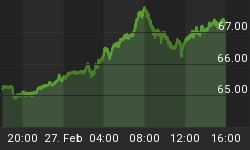Presently US investors are coming to the end of a very disturbing period in financial history: the lost decade. Certainly not the first - or last - of its kind, these periods are nevertheless extremely unsettling for retail investors who lack the knowledge or perspective to make informed decisions on how best to move forward.
For instance, over the last several years - the later part of this "lost decade" - we've seen more and more retail investors moving into the bond market in some fashion. Granted, not all are going out and buying bonds directly; many are purchasing bond-focused mutual funds, ETFs, etc.
Unfortunately, this includes large numbers of "unsophisticated" investors (this isn't a slight; the SEC has a working definition of "unsophisticated" or "unqualified" investors based on income and net worth - they aren't allowed to purchase unregistered investment products like hedge funds because they typically don't understand the risks). After decades of decreasing financial literacy in the United States - few high school graduates even understand the potential impacts of compound interest anymore - most of these retail investors are in way over their heads.
In conversations with a number of these investors we've asked how bonds respond to an environment of rising interest rates. Few understand that the market values of outstanding bonds fall. Why? In order for investors to buy bonds with below-market rates, they need a discount as incentive. This relationship can be reduced to a mathematical formula - to keep our discussion relevant we won't publish it here.
Aside from this simple fundamental aspect of bonds, few investors even comprehend the sheer size of the debt market. Globally, the value of the bond market totals roughly twice that of stock markets (totaling more than $80 trillion as opposed to $40-50T), with tens of thousands of issuers including companies, municipalities, agencies, and sovereign nations.
Similarly, few retail investors today have the historical perspective to understand what happens when credit markets grow too large or too fast, or how quickly things can turn very bad when a debtor's repayment ability is called into question.
Consider Russia in 1998. Throughout the year that country's national debt had been expanding and production fell in some key sectors (coal has been an oft-cited example, and in that industry wages were actually frozen for a time). As difficulties mounted and production lagged (causing sagging exports), the ruble began to weaken in international markets.
Midway through the year, the IMF and World Bank arranged an international loan to shore up both the ruble and Russian debt. Somehow, roughly a quarter of the funds disappeared immediately upon arrival. In this case the claim is that they were stolen, though the cause for their disappearance is essentially irrelevant (in this country they would more likely be distributed among key unions), the funds simply weren't there to help stabilize the country monetarily.
Everything came to a head on August 13, 1998, when the floor gave way and Russia's bond market collapsed. Investors had suddenly begun to doubt Russia's ability to repay its bonds, and once prices began tumbling they quickly started an avalanche, which ultimately lead the noted failure of early hedge-fund Long-Term Capital Management, which counted among its directors several PhDs and even Nobel laureates.
At one point during the collapse, interest rates on Russian debt reached 200%. This means that previously-issued bonds with stated interest rates of, say, 5%, were worth only .025% of their face value. In other words, a thousand dollar bond paying 5% interest was suddenly worth about $0.25.
As a result of the crisis on Aug 13th, four days later Russia had to intentionally devalue the ruble. It also suspended interest payments on debts held by foreign investors, an all-too-common occurrence throughout history during various debt crises, and a terrible potential impact of a future crisis for the United States, given the dollar's standing as the world's reserve currency.
The lessons to be learned from this are numerous. Hopefully more retail investors will avoid dabbling in markets they know little about, but if they're going to continue playing the game at least will know more of the nuances. Namely, investors should know that when interest rates begin to rise on government debt, quite often they don't creep - they jump.
When these interest rates jump, the value of outstanding bonds doesn't slide - they plummet. When there are doubts concerning the repayment of debt by a sovereign nation (which we're already beginning to hear from both sides of the political isle), rarely is the case that investors simply demand marginally higher interest rates in order to absorb newly issued debt. Instead, there simply is no money available. Investors refuse to buy bonds at almost any rate of interest.















